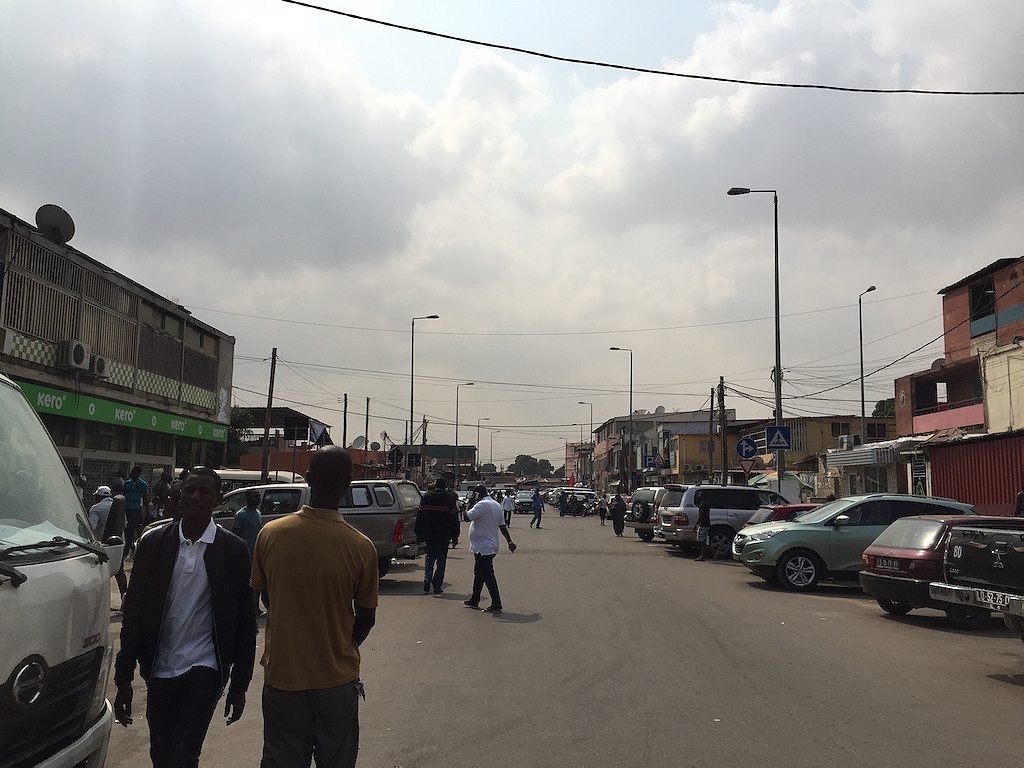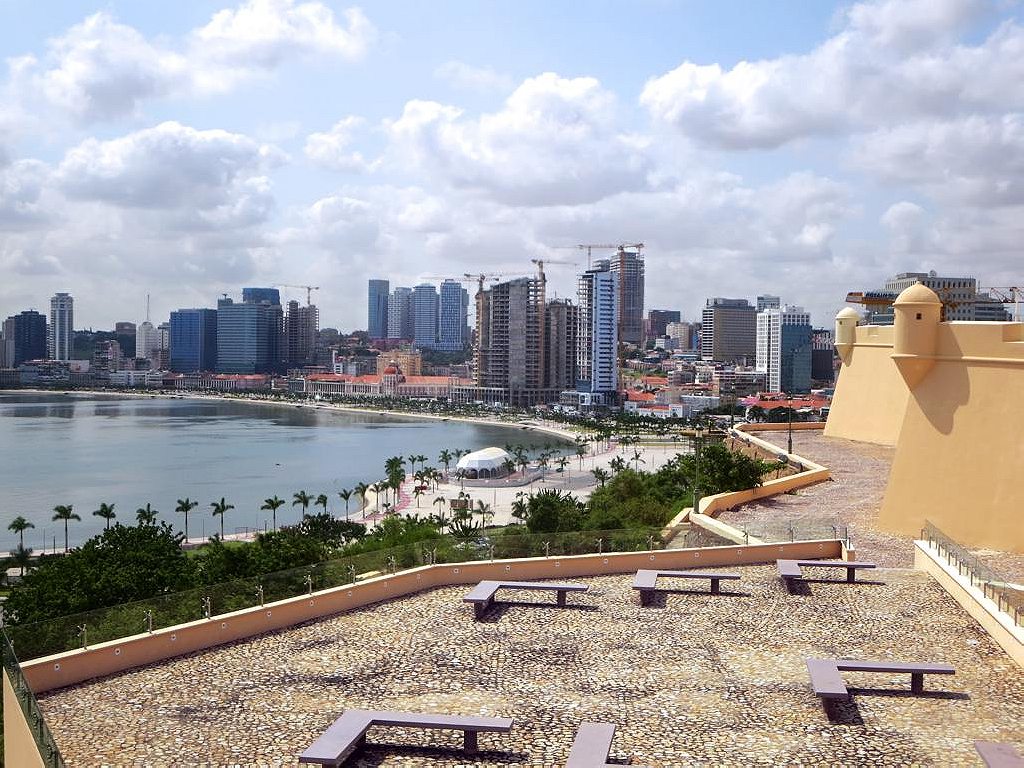One man goes in search of foreign currency in a bust economy
I sat on a wooden stool and surveyed my tight surroundings. I was in the back room of a small, makeshift shop selling smartphones, USB drives, and headphones, waiting for a black market currency dealer. As I sat there, I wondered how exactly many of the citizens of what was once one of the fastest growing economies in the world ended up having to exchange money this way, as if we were buying illegal drugs.
Until about 2014, Angola was drunk off its double-digit economic growth, fueled by the highest oil prices we’d ever seen. The country, in south-west Africa, is blessed with countless natural resources, a rich culture, and a bloody history. Angola weathered 27 years of brutal civil war before peace finally came in 2002. Then came riches: even now, Angola is sub-Saharan Africa’s largest oil exporter. High international oil prices during the last decade, coupled with increasing oil production, made Angola one of the fastest-growing economies in the world, surpassing even China in 2008. Back then, foreign currency was abundant.
Now, most of Luanda’s foreign exchange trading happens in the streets of the predominantly Muslim neighborhood of Mártires, opposite Luanda’s International Airport. Mártires is home to West Africans from Senegal and Mali, as well as a smattering of Lebanese migrants, and is perhaps the most diverse enclave in the city. It is home to the largest mosque in Angola, which is a predominantly Christian country. Most people converse in Wolof, French, Bambara and Arabic instead of Portuguese. Local restaurants, such as Banadir, off Mártires’ main road, could be mistaken for any modest eatery in Dakar or Bamako.
As soon as I stepped off the candongueiro (Luanda’s ubiquitous blue and white minibus taxis), I was approached by several men, who asked me if I wished to exchange Kwanzas. Right there. In the middle of the street. Like it was legal. I played it cool as they quoted astronomical rates between 500 and 530 Kwanzas to the dollar, several times more than the official rate of 167 Kwanzas.
People and cars, from all walks of life, were coming into the neighborhood. Since my last visit, Mártires had become the people’s bank, an open-air, street-side foreign exchange trading floor. Drivers would pull up in Range Rovers and Toyota Land Cruisers, speak on their phones and wait. A short while later, someone would show up, and get in the idling car, and get out again after a few minutes. Others arrived on foot, haggled on the street, and were then led into small electronics shops.

I kept walking down the street until I was approached by another gentleman who quoted friendlier rates. We’ll call him Coulibaly. His Portuguese was poor, and my French is virtually non-existent, but with a few smiles, hand gestures, and Google Translate, we struck up a conversation. Dressed in jeans and a polo shirt, with a Samsung smartphone in his hand, Coulibaly, like many of Mártires’ residents, is a recent immigrant to Angola. He has been living in Luanda for almost a year. He abandoned his native Mali to try his luck here. “I had almost nothing in Bamako,” Coulibaly said. “I have friends that have been living here for years, so I came. There is a lot of money in Angola. I can make enough to send back to my family.”
Many migrants from Mali and Senegal have found profitable livelihoods as kinguilas, exchanging currency on the black market. We reached a deal and I promised I would return with cash the next day, once I was happy with the rate and for safety reasons. I’m not a fan of carrying large quantities of Kwanzas in the streets.
In March 2014, the promoters behind a new $50 million luxury mall development in downtown Luanda announced that Gucci, Prada, Ermenegildo Zegna, and Armani were among their future tenants. “It will be their first stores in the country,” the promoters said. “Angolans are willing to pay up to 30% more than what they would pay in Europe, to purchase the products in their country,” they enthused. The boom ended before the mall could open.
Angola’s economic growth has always been an illusion
During the boom, Luanda resembled a massive construction site, with dozens of shiny glass and steel skyscrapers popping up all over the city, built in a frenzied bid to meet demand for luxury apartments and premium office space. There was no regard for history or human rights. Entire neighborhoods were bulldozed in the middle of the night. Poorer residents were bussed to the outskirts of the city and forced to live in tents.
When I moved back to Angola in 2013, the country’s currency, the Kwanza, was valued at 100 to the dollar. Obtaining foreign currency was the easiest thing: you could just walk into any bank and exchange your Kwanzas. Currency exchange houses proliferated throughout the city and dollars were in plentiful supply, bolstered by billion dollar payments from oil giants such as Exxon, Total, and BP.
But Angola’s economic growth has always been an illusion: high oil prices and sleight of hand. Rather than bringing large swathes of the population out of poverty, economic growth in Angola served to exacerbate inequality and entrench rampant corruption.
The government has been in power since independence and has little incentive to govern for the people, its socialist roots long ago forgotten. Around 70 percent of the population lives on less than $2 a day, so no matter how many skyscrapers are built, and no matter how many Porsche Cayennes prowl our potholed roads, poverty is visible everywhere.
As has become the disturbing cliché in several African countries, the President, José Eduardo dos Santos, and his clique control virtually every aspect of the economy, stifling true economic development and hoarding the wealth for themselves. The eldest daughter of President, Isabel dos Santos, is not only the richest person in the country but also the richest woman in Africa. Several of the President’s closest allies are billionaires several times over.
They own everything. I’m researching this article using Isabel’s internet company, while I check my Twitter feed on my iPhone using Isabel’s phone company, and drink a late night glass of red wine bought at Isabel’s new supermarket, which I drove to with a car that runs on fuel I bought at a gas station owned by the vice president. Why don’t we just buy from the competition, you ask? Certainly. I could buy airtime from the only other cell phone network in the country, which coincidentally is also owned by the vice president, and could have bought my bottle of wine at the main competitor to Isabel’s supermarket, which is also owned by—you guessed it—the vice president.

Angola spends the least among its continental neighbors on health and education (instead, the state has invested heavily in defense and security.) Not one local university is among Africa’s top 100. Infant mortality rate is among the top three highest in the world, and there are perennial yellow fever outbreaks. At the height of the latest outbreak, dozens of people were dying every day. Hospitals ran out of syringes, gloves and eventually, beds.
Well-off citizens go to neighboring Namibia for medical care rather than risk a visit to public hospitals here. Families send their children to study abroad. Both sending your kids to study abroad and getting medical check-ups in other countries require one thing: foreign currency.
Because the government has never had to rely on taxes or actually running the country to keep power and earn votes, its management of the windfall of oil money has been shambolic. As the price of oil has dramatically decreased over the last couple of years, so too has the infamous Angolan swagger. Inflation has increased by over 20 percent, the supply of foreign currency has dried up, and a full-blown economic crisis is underway.
The Kwanza has plummeted in value. The few banks that still exchange currency—maybe one or two, depending on who you know and how important your connections are—limit exchanges to $1000 or less. Plus you need to show a visa and a plane ticket to prove you’re traveling abroad. So most people have only one option: exchanging their Kwanzas on the black market.
Black humor is never lacking in Angola
The next day, black market currency dealer Coulibaly was waiting for me in Mártires. “It’s been very difficult to find dollars,” he warned. Today, the Kwanza was trading at 553 to the dollar on the black market. The official rate was 166 Kwanzas. It was becoming prohibitively expensive to exchange them, and the result was devastating. Children who were studying abroad were being forced to come back home. People started joking—black humor is never lacking in Angola—that it was the absolute worst time to get sick, as no one could afford to leave the country to get to a good hospital.
Coulibaly checked I had the Kwanzas I promised, and that I agreed to the most recent rate hike. Then he made a call, speaking softly into his phone, hung up, and told me to follow him. We went past the other kinguilas, past a market selling halal meat, and away from the main avenue and down a side street with houses and shops on both sides. We went into the makeshift phone shop, he greeted the shop owner in Bambara, then led me to the cramped room in the back. “Wait here,” he said, and I sat down on the wooden stool.
Ten minutes later Coulibaly returned with another man, who was tall and dressed in a loose-fitting white shirt with black trousers. He had wads of hundred dollar bills stuffed in his pockets. Coulibaly brought out a calculator, asked for my Kwanzas and handed me a few crisp bills. It was done.
A few weeks later, the price of foreign currency reached an all time high: more than 600 Kwanzas to the dollar. The government announced a series of new measures to try to curb the sale of dollars on the black market, and promptly arrested four kinguilas, confiscating their cash. Kinguilas were blamed for the sudden decline in the value of our national currency. Never mind that there was nowhere else to get dollars. It’s customary for the government here to go after the smallest players.
The million dollar question here is how Coulibaly and the hundreds of other kinguilas around Luanda get their hands on to foreign currency, given that even banks are having trouble doing this. Coulibaly was quite circumspect about the subject. There are rumors that wealthy generals with links to private Angolan banks were in on the racket. Whatever the truth, it’s obvious that someone is profiting handsomely from the scarcity. Most people—including local economists—blame bank officials, while others swear that foreign currency is flowing straight from the Central Bank on to the streets.